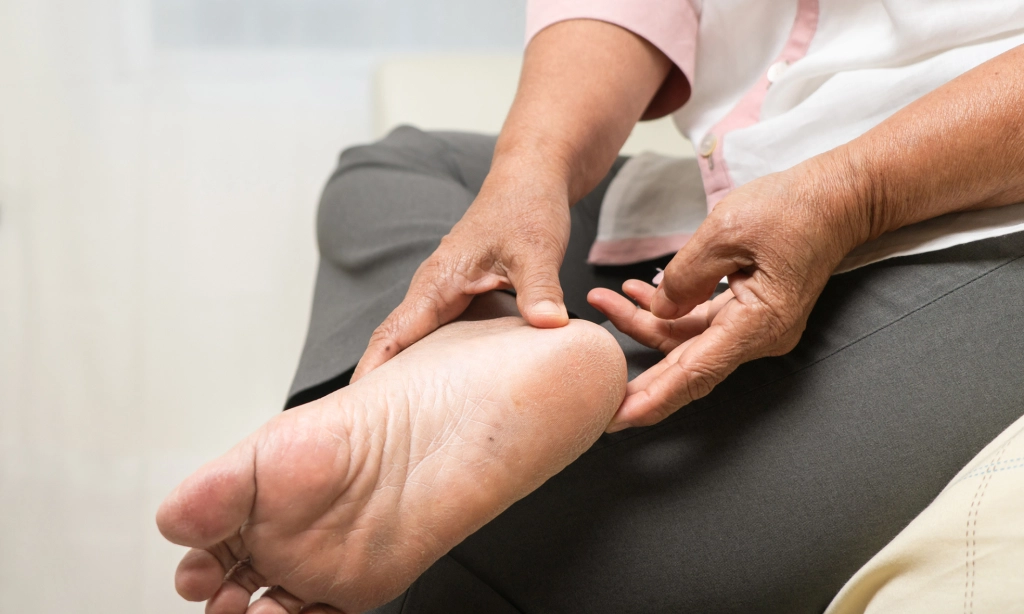Caring for your feet is always important for those who have diabetes, but summer can present unique challenges. Changes in temperature, footwear and moisture levels can increase the risk for dehydration, cuts and blisters. Thankfully, there are ways to make sure you are protecting your diabetic feet during the summer.
Wear the right shoes
As temperatures soar, it’s tempting to ditch thick socks and close-toed shoes for a pair of sandals, flip-flops or bare feet. However, the problem with this footwear is they lack protection for your feet.
Even though an open style allows air to flow, it also can allow bits of rocks, glass or other foreign bodies to get lodged in the skin and cause damage.
Deciding to go barefoot could lead to burns and increase your risk for stepping on a dangerous object. Diabetics with neuropathy or numbness may not feel when they step on a sharp object, stub their toe or burn their skin.
Medicare Part B and many other medical insurances cover therapeutic shoes and inserts annually for diabetic patients who have neuropathy in their feet.
Check your diabetic feet every day
Two-thirds of diabetic patients have neuropathy, meaning that nerves do not send accurate brain signals when something is painful or wrong with the feet.
An easy way to protect your diabetic feet is to check them daily for breaks in the skin, blisters and discolorations. It’s important to look in between your toes and check inside your shoes with your hands before putting them on.
If you see a problem, like a new sore or wound, contact your physician or podiatrist immediately.
Monitor your blood sugar levels
It’s important to keep hydrated, especially during the heat of the summer. Sugary beverages and frozen drinks can contribute to issues controlling glucose levels.
Your best option is typically plain or fruit infused water, unsweetened iced tea and sugar-free popsicles.
The American Diabetes Association set general target blood sugar ranges below, but make sure to check with your physician on what your specific target range is.
The American Diabetes Association suggests these general target blood sugar ranges:
- Before meals: 90-130 mg/dl
- Two hours after start of meals: Less than 180 mg/dl
Care for your skin
Diabetic neuropathy not only decreases sensation, but it can also damage the nerves responsible for maintaining supple, healthy skin. This can cause dry, cracked skin on the feet.
Moisturize dry skin on the feet with a cream daily, this will help the skin stay soft and prevent fissures.
Do not apply creams or lotions between toes, this interspace is already moist enough.
Callouses need to be trimmed by a podiatrist or trained health care professional.
Watch for scaly, itchy skin on the feet, this is common during the summer and can be a sign of foot fungus.
Visit your physician or podiatrist for more information on protecting diabetic feet
Because diabetes is the number one risk factor for having a foot or leg amputation, it is crucial that diabetic patients have regular examinations with health practitioners, especially a podiatrist.
If you have diabetes and it has been longer than a year, make an appointment with your podiatrist. They can assess you for neuropathy and give you tools to avoid foot complications.
Diabetic patients with neuropathy need frequent appointments and should see a podiatrist every couple of months for a foot inspection, toenail and/or callous trimming. Ask them about their recommendations for the right shoes. They want to help you learn about protecting your diabetic feet and enable your feet to last a lifetime.
Social Share
At Enhabit our patients are our number one priority. From providing the latest medical practices to building deep personal connections, we’re focused on upholding every patient’s dignity, humanity and sense of control on their healthcare journey.
Home health
Our home health services give patients access to the care they deserve in the comfort of their own homes. From disease and injury management to recovery from surgery, our clinicians help patients confidently achieve their healthcare goals.
Hospice care
Our hospice care services place importance on the comfort of every patient living with a terminal illness. Our caring professionals are dedicated to providing not just physical care, but spiritual and emotional support to every patient and their loved ones.

 Back to Resource library
Back to Resource library




